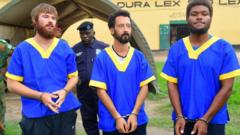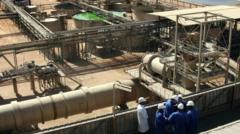The trio had their sentences commuted from death to life in prison prior to their repatriation amid ongoing U.S.-DR Congo negotiations on mineral investments.
Three Americans Released from DR Congo to Serve Sentences Back Home

Three Americans Released from DR Congo to Serve Sentences Back Home
Three Americans involved in a failed coup in the Democratic Republic of Congo have been returned to the U.S. to continue their prison terms.
The three Americans, convicted for their involvement in a failed coup attempt in the Democratic Republic of Congo (DRC) last year, have been repatriated to the United States to serve their remaining prison terms. Initially sentenced to death by a military court, their sentences were recently commuted to life imprisonment before their return.
According to U.S. Department of State spokesperson Tammy Bruce, the three men—Marcel Malanga Malu, Tylor Thomson, and Zalman Polun Benjamin—are now "in our custody." Their repatriation coincides with ongoing discussions between the U.S. and DRC regarding potential exploitation of the country's significant mineral resources, including coltan and cobalt, which are critical for electronic devices and electric vehicle batteries.
This transfer was confirmed by presidential spokesperson Tina Salama, who indicated it followed strict legal procedures and is part of efforts to enhance judicial diplomacy and international human rights cooperation between the two nations.
In September, a military court sentenced the Americans along with 34 others to death for the coup attempt that involved an armed assault on both the presidential palace and the residence of a close ally of President Félix Tshisekedi. Although the Americans consistently denied the charges of criminal conspiracy and terrorism, the leader of the attack, Christian Malanga, was killed during the incident along with five others.
Notably, Jean-Jacques Wondo, a dual Congolese and Belgian citizen sentenced to death, was previously transferred to Belgium due to health issues. The status of other non-American convicts, including nationals from Britain, Belgium, and Canada, remains unclear regarding potential commutations of their sentences.
While the U.S. government has condemned the armed attacks and supports the DRC's efforts for accountability, legal experts indicate that it is improbable that the U.S. will reduce their sentences further. In a related context, Joseph Szlavik-Soto, a lobbyist for the Congolese government, mentioned that an agreement was reached to compensate for damages incurred by protests against the U.S. Embassy earlier this year.
The dynamics and implications of this repatriation and the ongoing U.S.-DR Congo negotiations highlight the increasingly interwoven relations between security, justice, and resource management in this richly endowed nation.
According to U.S. Department of State spokesperson Tammy Bruce, the three men—Marcel Malanga Malu, Tylor Thomson, and Zalman Polun Benjamin—are now "in our custody." Their repatriation coincides with ongoing discussions between the U.S. and DRC regarding potential exploitation of the country's significant mineral resources, including coltan and cobalt, which are critical for electronic devices and electric vehicle batteries.
This transfer was confirmed by presidential spokesperson Tina Salama, who indicated it followed strict legal procedures and is part of efforts to enhance judicial diplomacy and international human rights cooperation between the two nations.
In September, a military court sentenced the Americans along with 34 others to death for the coup attempt that involved an armed assault on both the presidential palace and the residence of a close ally of President Félix Tshisekedi. Although the Americans consistently denied the charges of criminal conspiracy and terrorism, the leader of the attack, Christian Malanga, was killed during the incident along with five others.
Notably, Jean-Jacques Wondo, a dual Congolese and Belgian citizen sentenced to death, was previously transferred to Belgium due to health issues. The status of other non-American convicts, including nationals from Britain, Belgium, and Canada, remains unclear regarding potential commutations of their sentences.
While the U.S. government has condemned the armed attacks and supports the DRC's efforts for accountability, legal experts indicate that it is improbable that the U.S. will reduce their sentences further. In a related context, Joseph Szlavik-Soto, a lobbyist for the Congolese government, mentioned that an agreement was reached to compensate for damages incurred by protests against the U.S. Embassy earlier this year.
The dynamics and implications of this repatriation and the ongoing U.S.-DR Congo negotiations highlight the increasingly interwoven relations between security, justice, and resource management in this richly endowed nation.


















